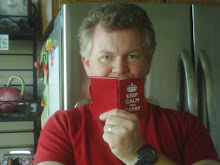More Backlogged Thoughts...
I've been more keenly aware of the passage of time, even since moving into the new house. We have a clearer view of the eastern horizon in the mornings when I have time to ponder while I feed the dogs.
Here in West Point, we're a bit further from the light pollution, so I can see so many more stars in the pre-dawn hours, and we're a bit further from the mountains, so the skyline is a little closer to the horizon. The net effect is that I can more accurately observe certain stars and constellations rising in the morning. For instance, shortly after we arrived, I could see the Pleiades just above the horizon, and Orion was just clearing it, looking more like a bow tie than a mighty hunter.
My stars are out now, the stars I kind of associate with my "home" season of the year... Rigel, Betelgeuse, Aldebaraan... the stars in and around the Orion constellation are usually pretty close to dead-overhead when I think to look at them and recognize them. Usually this is in the fall and early winter. Weeks ago, these stars, along with Canopus (the "Dog Star," which reputedly gives the "Dog Days" of August their name), debuted in the morning sky, which reminded me we were easing into Autumn again. A brief whiff of a chill in the air last Monday at around 5 p.m. confirmed it.
Funny thing I noted as I watched the stars, almost before my eyes, rise higher and higher each morning, was that centuries ago, there was a whole caste of people who's social responsibility was to watch the stars, watching for signs or omens of things to come. They came to be known as the "Magi," and were widely revered with certain degree of awe, as people looked on them and wondered, "How did they know that was going to happen?"
Cynically, it was merely a matter of recording close observations, recognizing patterns, and keeping such proprietary techniques under wraps.
Astronomy has always been closely associated with astrology. Indeed, even in the days of Johannes Kepler, the great astronomer who developed the basic Laws of Planetary Motion, the main reason a monarch even kept a stellar observer on staff was to draw up a regular Star Chart that might figure into official state policy.
Even when I was in college, I'd tell people I was studying astronomy, and they'd tell me they were a Pisces, or ask me if I really believed in fortune-telling.
But the ancient astronomers used their knowledge of the cycle of the constellations and the position of the sun in the sky to establish what time of the year it was, and predict or at least advise on matters of the season, like annual flooding and growing seasons. I think the Farmer's Almanac does something similar, these days.
How did it get so out of hand, though, that someone observing the stars came to be known as someone with mystic insights and connections with the gods themselves?
Not sure though, but I've also picked up on this tidbit: apparently, the way we've come to associate certain personality traits with being born on certain dates has much to do with this tradition of really knowing one's times of the year, but it also involves having insight into the environmental conditions a person is exposed to during their gestation.
In other words, one might have an idea of what a person's temprament might be like if they knew what their mother was going though during the pregnancy, and most of all, what their mother was likely to eat during the pregnancy that might affect the brain's development, and thus their personality.
An example of this might be that a person born in October was conceived in late December, early January. In some climes, that means the mother has access to very little fresh food during early pregnancy, mostly dried or pickled foods or else foods that store easily, like grains. The curing or preserving process of these foods might affect the brain chemistry at an early stage of pregnancy in a certain way that's different from someone conceived in June or July (more access to fresh foods and the like), and so their personality is distinctly different.
Nowadays, this effect is less pronounced because we simply have more access to foods of all kinds, so a "Libra" might not be as different from an "Aries" as one might have used to be 3 000 years ago, and now with so many people living on highly processed foods, who knows what effect that has on the modern personality...
Did I mention I really dig astronomy?


1 Comments:
I love astronomy. I love looking up at the sky and being filled with wonder. I too recognize those stars very easily. And while I have a calendar, the phases of the moon are regularly used to clue me in to different time periods too.
Post a Comment
<< Home